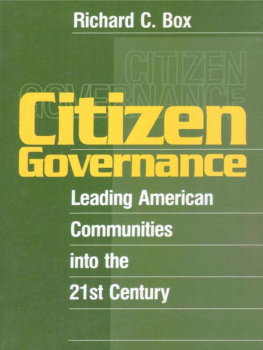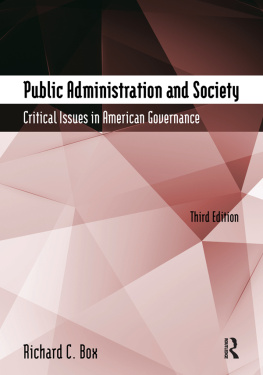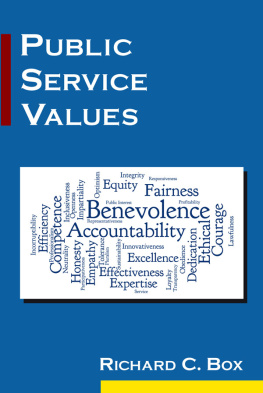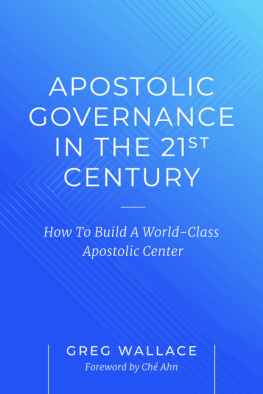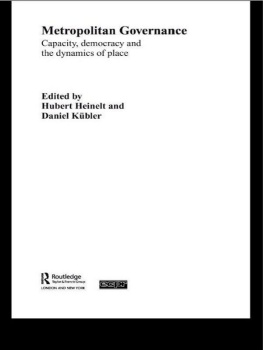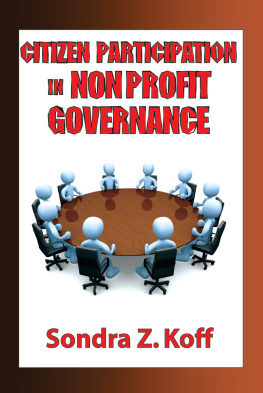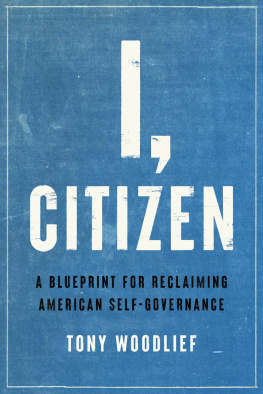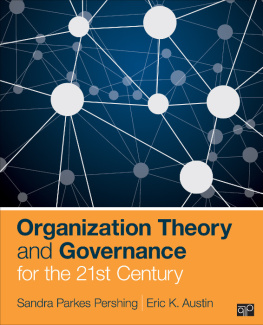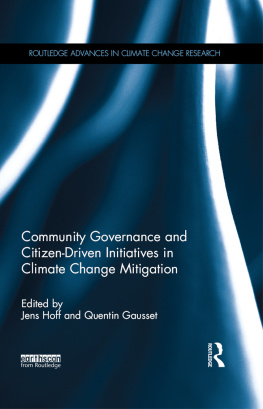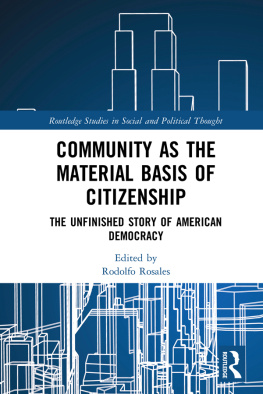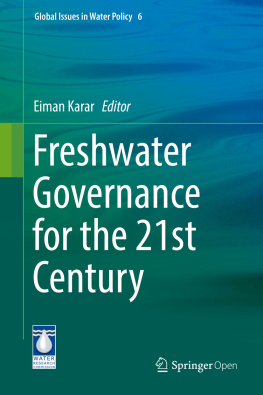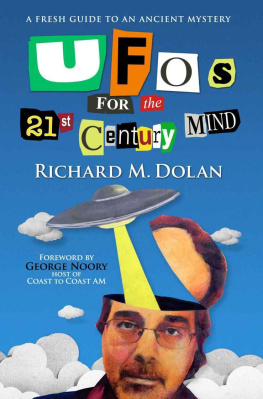Copyright 1998by Sage Publications, Inc.
All rights reserved. No part of this book may be reproduced or utilized in any form or by any means, electronic or mechanical, including photocopying, recording, or by any information storage and retrieval system, without permission in writing from the publisher.
For information:
 | SAGE Publications, Inc.
2455 Teller Road
Thousand Oaks, California 91320
E-mail: |
SAGE Publications Ltd.
6 Bonhill Street
London EC2A 4PU
United Kingdom |
SAGE Publications India Pvt. Ltd.
M-32 Market
Greater Kailash I
New Delhi 110048 India |
Printed in the United States of America
Library of Congress Cataloging-in-Publication Data
Box, Richard C.
Citizen governance: American communities in the 21st century/by Richard C. Box.
p.cm.
Includes bibliographical references and index.
ISBN 0-7619-1257-6 (cloth: alk. paper).ISBN 0-7619-1258-4 (pbk.: alk. paper)
1. Local governmentUnited StatesCitizen participation. 2. Political participationUnited States. I. Title.
| JS331.8681998 |
| 352.140973dc21 | 97-33722 |
99 00 01 02 03 04 10 9 8 7 6 5 4 3 2
| Acquiring Editor: | Catherine Rossbach |
| Editorial Assistant: | Kathleen Derby |
| Production Editor: | Michele Lingre |
| Production Assistant: | Lynn Miyata |
| Typesetter/Designer: | Marion Warren |
| Indexer: | Julie Grayson |
| Cover Designer: | Candice Harman |
| PrintBuyer: | Anna Chin |
Foreword
I n the early 1970s, I lived in a subdivision in a rapidly growing suburb of Pittsburgh. There was one street into the subdivision; every day, when the school bus stopped to let the kids off, the street was completely blocked. The community had a council-manager form of government, and many of the council members were representative of the old residents.
As the community grew, the need for an additional fire station became apparent. Acting on the advice of the Community Planner, the Council approved locating a substation just within the entrance to the subdivision on a piece of land owned by the deputy fire chief, one of the old residents (it was an all-volunteer force at the time). Two hundred residents of the neighborhood presented a petition to the Council explaining the problem with the school bus and asking why the station could not be located in a vacant field across the road form the subdivision. We were assured by the planner that zoning variances would handle any problems although he had never been on the street when the school bus stopped.
At the end of the meeting, the Mayor, a milkman by trade, thanked us for our participation and informed us that he was persuaded by the Planner because he is our expert. Shortly thereafter I decided to go to graduate school so I could be an expert too. The Planner ultimately became vice president of the largest development corporation in the area. The fire substation was not built in the neighborhood.
This case illustrates many of the issues that Richard Box raises in this bookthe citizen as outsider, the practitioner as expert, and the legislative body as representative of elite interests. The Community Governance Model outlined in this book would change those roles, making the citizens decision makers with the practitioner as expert adviser and legislators responding to the needs of all community residents.
Professor Box has drawn on his rich experience as a local government manager, coupled with his studies of democratic processes and public administration, to develop a model of governance which serves the public and, in its ideal form, enhances the professional life of practitioners. He readily admits that his is a normative vision of how local governments can be managed, but he sees it emerging all over the country as citizens insist on meaningful participation in the development and implementation of policies that affect their lives.
The Community Governance Model is carefully developed to address the traditional values of public administratione.g., efficiency and effectivenesswhile also involving citizens more dynamically in the process of governance. The primary role of the administrator is to ensure that the policy process is open and inclusive and to provide advice and technical assistance to citizens who have traditionally been left out of local government decision making.
The model is compelling to those of us who believe deeply in the basic concept of government by the peopledemocracy with all its flaws. Early in this century, public administration was developed to improve government by importing management principles from business. One of the most important principles was executive control over implementation decisions in order to maximize efficiency and minimize political interference. Ironically, the Progressives who espoused good government also created a governance model which excluded ordinary citizens and skewed democracy toward the interests of elites.
Richard Box is attempting to bring public administration back to democracy by drawing new roles for practitioners and citizens in the governance of their own communities. Pointing to the widespread distrust of government today, Box argues that the exclusion of citizens has diminished the expertise of practitioners and the legitimacy of legislators. The only way out of this dilemma is to restore democratic principles by giving citizens a positive, inclusive role in the policy process. Involving citizens in governance will develop greater understanding of the role of government in society, the complexities of policy development, the difficulties of achieving consensus among diverse interests, and the nature of the public administrators job.
Boxs vision is no panacea, however, and he identifies some of the risks involved in implementing the Community Governance Model. Citizens will be involved not only in developing policy but also in implementing it. This may be expecting a lot of many citizens who are less involved in civic affairs today than earlier generations. There is a greater risk for practitioners who may offend powerful elite interests by working with other citizen groups; and they will no longer have the politics-administration dichotomy to hide behind with its imprimatur of expertise. Community governance implies that no individual has the solution to community problems so that involvement with citizens is a necessary function of the practitioners work.
I also worry, and continually remind Richard, about the narrow interests of communities. How can we in the broader community ensure that community governance does not devolve to the protection of parochial and exclusionary community interests? Isnt it easier to implement this model in the walled-in, economically elite subdivisions that are springing up all over the country? How will community governance serve the interests of the poor, the disabled, the others of our localities? How will communities expand their policy base to include the interests of the greater community outside their neighborhoods? How can community governance be implemented in the large urban areas of our nation?



